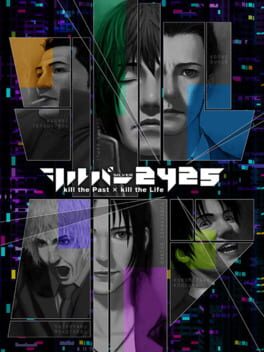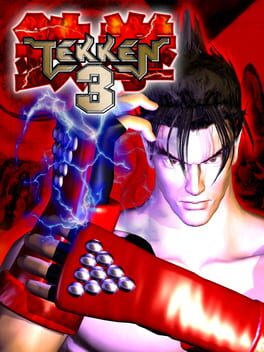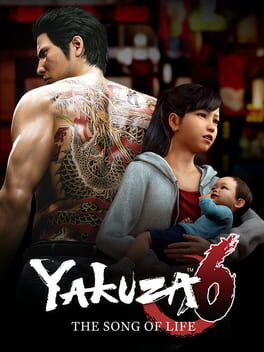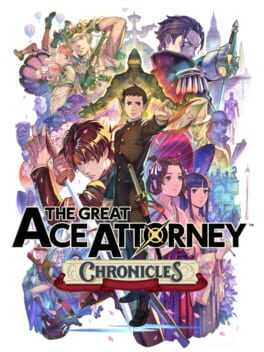Bio
Player of Video Games
Player of Video Games
Badges

Famous
Gained 100+ followers

Pinged
Mentioned by another user

Well Written
Gained 10+ likes on a single review

Organized
Created a list folder with 5+ lists

Liked
Gained 10+ total review likes

Donor
Liked 50+ reviews / lists

Listed
Created 10+ public lists

Best Friends
Become mutual friends with at least 3 others

3 Years of Service
Being part of the Backloggd community for 3 years

GOTY '21
Participated in the 2021 Game of the Year Event

Trend Setter
Gained 50+ followers

Elite Gamer
Played 500+ games

Popular
Gained 15+ followers

Gamer
Played 250+ games

Noticed
Gained 3+ followers

N00b
Played 100+ games
Favorite Games
706
Total Games Played
006
Played in 2024
018
Games Backloggd
Recently Played See More
Recently Reviewed See More
Having been a fan of this series for nearly six years by now, The Great Ace Attorney Chronicles was something I had been highly anticipating. They are the only games in the series to have no plot connection to the main continuity, essentially being a spinoff. This means that Shu Takumi's team could start from scratch and develop an entirely new story and cast without having to be held back by the worries of having to make the plot align with the main series. This is something that has noticably become a struggle for Yamazaki’s team (responsible for the Investigations games, Dual Destinies and Spirit of Justice) in recent years, who have been granted the freedom to write the stories as they like but having to retcon a lot of the timeline due to the messy planning of Apollo Justice and making the series become incredibly convoluted and unfocused. Because of these decisions, I had become worried about the future of this franchise and whether or not it could continue on.
And this is why I found The Great Ace Attorney Chronicles to be a great idea. There was a chance to start over and rebuild itself. And the games excelled at that. Despite maintaining the typical base Ace Attorney gameplay mechanics and tropes that we have grown accustomed to, these games are innovative and consistently defy the structure we have learnt to expect from the series. For a multitude of reasons, I can call these games the most ambitious the series has ever gotten, being truly refreshing in every way.
The quality of TGAAC’s production is an unbelievable high for the series. This is the best the series has ever looked. The transitions from sprite to sprite have become a lot less choppy and feel more fluid, likely due in part to the games no longer being limited by 3DS hardware. The sprites play such a big role in characterization but unlike previous installments in the series, they have become essential to conveying character progression as well. Seeing the protagonist Ryunosuke go from darting his eyes all over the place and weakly slamming the table to keeping a focused gaze and slamming down with full confidence is such excellent usage of animation and sound design that helps portray his character arc so well. Besides the lack of anime cutscenes, you would have never guessed that TGAA2 had a lower budget especially with its occasional gorgeous fully animated sequences. The animation is implemented perfectly into the game’s brand new Dance of Deduction segments, which makes full use of dynamic camera movements and lighting to make the experience all the more exciting.
The Dance of Deduction is one of the newly added gameplay elements into The Great Ace Attorney and a highly memorable one at that. The mechanic revolves around the character Herlock Sholmes analyzing the scene at hand and making numerous observations. These observations are slightly off and end up leading to incorrect conclusions. It becomes your job to correct these observations in order to get the right conclusions from the scene at hand. This gimmick is wonderful and makes investigation sequences so much more fun, seeing two grown men prance around the room while trying to understand their situation at hand. While it is highly enjoyable, I find that it can be tedious having Sholmes run through his full deductions only to go through them again but this time with you having to correct his mistakes. While this approach works for the first time you do the Dance of Deduction due to showing just how crazy Sholmes is, it does end up being needlessly long for every DoD after that. I would have preferred if Sholmes only ran through his deduction once with you having to step in whenever he makes a mistake (which does end up being done at some point) or an option to skip through dialogue when you are running through the deduction a second time to prevent these sequences from being overly long. The pacing is my only issue though, otherwise I love these sequences.
There are two newly added trial elements. For one, you can now cross-examine multiple witnesses instead of just one, an element previously experimented with in the Phoenix Wright vs Professor Layton crossover. Along with just getting multiple accounts on the matter, you are able to switch gears and pursue a witness reacting to another witness’ statement. I would have liked this mechanic better if the witness’ reactions to each other were not blatant and instead you had to pay attention to how other witnesses are behaving in reaction to somebody’s statement. While this certainly would have taken a whole lot of development time, I think this way you could make it a more compelling mechanic that makes you have to pay attention rather than just have the witness’ reactions spelt out to you.
These games also include the addition of the jury, a surprisingly absent element in most of the series besides Apollo Justice. You get the chance to engage with the jury once or twice a trial in a summation examination. Essentially, they have all agreed on a guilty verdict at some point in the trial for one reason or another and you have to hear their arguments out and get at least three jurors to change their mind on the verdict. This is done by pitting jurors’ arguments against each other. I really, really like this new mechanic. Not only is it incredibly funny to observe some of the jurors’ ridiculous arguments for deciding on the guilty verdict, but I found that I had to think harder than with the average witness testimonies. Instead of finding a piece of evidence that contradicts a statement like with the witness testimonies, you have to find two statements that contradict one another. This makes you view the jurors’ arguments as a whole, cohesive package rather than each statement being separate from each other. While the actual contradictions ended up being simple to point out once you pressed all statements, I still found this mechanic a very compelling shift from the average witness testimony I had grown so used to in these games. Also, Ryunosuke pacing around the courtroom is beautiful.
What people praise most about these games, though, are its story and characters. I won’t spoil anything but I will say that the payoff at the end of the duology is incredibly satisfying and that the second game especially takes a lot of risks in character writing, a lot of which I ended up liking. These games are quite cohesive with nearly every case connecting to a bigger overarching plot, which had only been done before with the Investigations games respectively (where only one of which succeeded). Despite this duology succeeding at this structure overall, I do think that there are a considerable amount of continuity errors between the first and second game that do damage my investment in some of the characters a bit. Each Ace Attorney game usually has a rule of not spoiling any of the other games in the series for the sake of newcomers and I thought it was a bit ridiculous to implement some of this rule into TGAA2, especially considering that it is a direct sequel. I find this decision even more strange when one of TGAA1’s biggest plot points had been revealed in the sequel but they just choose to remain silent about everything else. Two extremely important characters in the first game are never mentioned again in the second game despite both of them contributing to a big reveal. In some cases, there are aspects of main characters whether it be a big detail in their backstory or setup for a new character arc which never end up being followed through with properly in the sequel. While I do really enjoy a lot of this story and think it really delivered on some fronts, it feels rather incomplete to me in these aspects. I heard that these games were meant to be a full trilogy rather than a duology which may be why some elements were forgotten about but I understand that the team were on a tighter budget with the second game.
I personally don’t want Ace Attorney to end just yet due to it being such an addictive formula that could still have so much great being done with it. However, if the series were to end for good then I think this was a great stopping point. Despite my complaints, it really feels like a culmination of everything great about the series, a celebration of all its silly gags and tropes while also holding true to its ethos of fighting for the truth no matter what. It is absolutely brilliant production-wise while also defying a lot of what we have come to expect of this series story and character-wise. I could not recommend this duology enough due to how well-rounded it is, I really think that anybody who enjoys video games could derive some enjoyment out of this.
And this is why I found The Great Ace Attorney Chronicles to be a great idea. There was a chance to start over and rebuild itself. And the games excelled at that. Despite maintaining the typical base Ace Attorney gameplay mechanics and tropes that we have grown accustomed to, these games are innovative and consistently defy the structure we have learnt to expect from the series. For a multitude of reasons, I can call these games the most ambitious the series has ever gotten, being truly refreshing in every way.
The quality of TGAAC’s production is an unbelievable high for the series. This is the best the series has ever looked. The transitions from sprite to sprite have become a lot less choppy and feel more fluid, likely due in part to the games no longer being limited by 3DS hardware. The sprites play such a big role in characterization but unlike previous installments in the series, they have become essential to conveying character progression as well. Seeing the protagonist Ryunosuke go from darting his eyes all over the place and weakly slamming the table to keeping a focused gaze and slamming down with full confidence is such excellent usage of animation and sound design that helps portray his character arc so well. Besides the lack of anime cutscenes, you would have never guessed that TGAA2 had a lower budget especially with its occasional gorgeous fully animated sequences. The animation is implemented perfectly into the game’s brand new Dance of Deduction segments, which makes full use of dynamic camera movements and lighting to make the experience all the more exciting.
The Dance of Deduction is one of the newly added gameplay elements into The Great Ace Attorney and a highly memorable one at that. The mechanic revolves around the character Herlock Sholmes analyzing the scene at hand and making numerous observations. These observations are slightly off and end up leading to incorrect conclusions. It becomes your job to correct these observations in order to get the right conclusions from the scene at hand. This gimmick is wonderful and makes investigation sequences so much more fun, seeing two grown men prance around the room while trying to understand their situation at hand. While it is highly enjoyable, I find that it can be tedious having Sholmes run through his full deductions only to go through them again but this time with you having to correct his mistakes. While this approach works for the first time you do the Dance of Deduction due to showing just how crazy Sholmes is, it does end up being needlessly long for every DoD after that. I would have preferred if Sholmes only ran through his deduction once with you having to step in whenever he makes a mistake (which does end up being done at some point) or an option to skip through dialogue when you are running through the deduction a second time to prevent these sequences from being overly long. The pacing is my only issue though, otherwise I love these sequences.
There are two newly added trial elements. For one, you can now cross-examine multiple witnesses instead of just one, an element previously experimented with in the Phoenix Wright vs Professor Layton crossover. Along with just getting multiple accounts on the matter, you are able to switch gears and pursue a witness reacting to another witness’ statement. I would have liked this mechanic better if the witness’ reactions to each other were not blatant and instead you had to pay attention to how other witnesses are behaving in reaction to somebody’s statement. While this certainly would have taken a whole lot of development time, I think this way you could make it a more compelling mechanic that makes you have to pay attention rather than just have the witness’ reactions spelt out to you.
These games also include the addition of the jury, a surprisingly absent element in most of the series besides Apollo Justice. You get the chance to engage with the jury once or twice a trial in a summation examination. Essentially, they have all agreed on a guilty verdict at some point in the trial for one reason or another and you have to hear their arguments out and get at least three jurors to change their mind on the verdict. This is done by pitting jurors’ arguments against each other. I really, really like this new mechanic. Not only is it incredibly funny to observe some of the jurors’ ridiculous arguments for deciding on the guilty verdict, but I found that I had to think harder than with the average witness testimonies. Instead of finding a piece of evidence that contradicts a statement like with the witness testimonies, you have to find two statements that contradict one another. This makes you view the jurors’ arguments as a whole, cohesive package rather than each statement being separate from each other. While the actual contradictions ended up being simple to point out once you pressed all statements, I still found this mechanic a very compelling shift from the average witness testimony I had grown so used to in these games. Also, Ryunosuke pacing around the courtroom is beautiful.
What people praise most about these games, though, are its story and characters. I won’t spoil anything but I will say that the payoff at the end of the duology is incredibly satisfying and that the second game especially takes a lot of risks in character writing, a lot of which I ended up liking. These games are quite cohesive with nearly every case connecting to a bigger overarching plot, which had only been done before with the Investigations games respectively (where only one of which succeeded). Despite this duology succeeding at this structure overall, I do think that there are a considerable amount of continuity errors between the first and second game that do damage my investment in some of the characters a bit. Each Ace Attorney game usually has a rule of not spoiling any of the other games in the series for the sake of newcomers and I thought it was a bit ridiculous to implement some of this rule into TGAA2, especially considering that it is a direct sequel. I find this decision even more strange when one of TGAA1’s biggest plot points had been revealed in the sequel but they just choose to remain silent about everything else. Two extremely important characters in the first game are never mentioned again in the second game despite both of them contributing to a big reveal. In some cases, there are aspects of main characters whether it be a big detail in their backstory or setup for a new character arc which never end up being followed through with properly in the sequel. While I do really enjoy a lot of this story and think it really delivered on some fronts, it feels rather incomplete to me in these aspects. I heard that these games were meant to be a full trilogy rather than a duology which may be why some elements were forgotten about but I understand that the team were on a tighter budget with the second game.
I personally don’t want Ace Attorney to end just yet due to it being such an addictive formula that could still have so much great being done with it. However, if the series were to end for good then I think this was a great stopping point. Despite my complaints, it really feels like a culmination of everything great about the series, a celebration of all its silly gags and tropes while also holding true to its ethos of fighting for the truth no matter what. It is absolutely brilliant production-wise while also defying a lot of what we have come to expect of this series story and character-wise. I could not recommend this duology enough due to how well-rounded it is, I really think that anybody who enjoys video games could derive some enjoyment out of this.
Edit: Not proud of this review these days, but leaving it up in case anyone wants to read.
A masterpiece of existential horror, Majora's Mask creates a unique feeling unlike any other game.
Because of the amount of depth in the NPCs' lives, they begin to feel like real people, and as a result you feel that imposing sense of doom even more strongly. That you are truly letting the lives of such a bright & happy town perish.
But you can still do good within this three day period. You help those in need, you bring comfort to these people in the face of dread. And that is your purpose as the hero of this story. Even when facing that inevitable end, you make the most of the time you have left to connect with those around you.
That's the best way I can sum up the beauty of Majora's Mask. The setting, the characters, the mechanics & how they intertwine with the story and the atmospheric music all come together to create this one-of-a-kind canvas covering all facets of human emotion. There will never be a game like this ever again.
A masterpiece of existential horror, Majora's Mask creates a unique feeling unlike any other game.
Because of the amount of depth in the NPCs' lives, they begin to feel like real people, and as a result you feel that imposing sense of doom even more strongly. That you are truly letting the lives of such a bright & happy town perish.
But you can still do good within this three day period. You help those in need, you bring comfort to these people in the face of dread. And that is your purpose as the hero of this story. Even when facing that inevitable end, you make the most of the time you have left to connect with those around you.
That's the best way I can sum up the beauty of Majora's Mask. The setting, the characters, the mechanics & how they intertwine with the story and the atmospheric music all come together to create this one-of-a-kind canvas covering all facets of human emotion. There will never be a game like this ever again.










